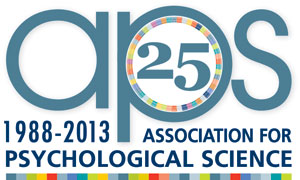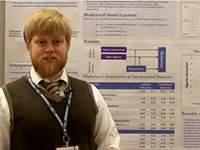Perspectives Celebrates 25 Years of APS
 APS is turning 25 — to celebrate, upcoming issues of Perspectives on Psychological Science will feature special sections that look back at the last 25 years of our field.
APS is turning 25 — to celebrate, upcoming issues of Perspectives on Psychological Science will feature special sections that look back at the last 25 years of our field.
As Perspectives editor Barbara A. Spellman observes in her introduction to the first special section in the May issue, the field of psychological science has seen some huge changes since 1988:
“There are now research and statistical tools that did not exist then; theoretical perspectives that have arisen or disappeared; and entire fields of inquiry that have been born, merged, split, renamed, and disbanded.”
According to Spellman, the special sections will include two types of articles. A series of longer articles will deeply examine changes in a research area that have occurred since at least 1988, and shorter articles by prominent researchers — many of them William James or James McKeen Cattell Fellow Award winners — will describe a major change in a specific field.
The special section in the May issue includes the following articles:
The Heart of William James, edited by Robert D. Richardson
James H. Austin
The Heart of William James, edited by Robert D. Richardson (2010), brings together 17 essays from the 19-volume set The Works of William James, published by Harvard University Press. The essays — presented in chronological order — cover a wide range of topics, from how our actions toward others affect our emotional state to the benefits of focusing on the positives in life. Although William James lived over 100 years ago, the topics and themes of his work still resonate today.
Roberta Michnick Golinkoff, Weiyi Ma, Lulu Song, and Kathy Hirsh-Pasek
In the early years of language research, investigators were forced to rely on records of children’s production of speech. This approach was limited because it could not examine the hidden language sensitivities children possessed but could not — or would not — verbalize. The introduction of the intermodal preferential looking paradigm provided a massive advance in the ability to determine children’s emerging language knowledge. In the last 25 years, this paradigm has been modified to allow researchers to study not only what language children know, but also how children learn language, how they process speech in infancy, and what elements make up the perceptual and conceptual underpinnings of language development.
The Nature-Nurture Debates: 25 Years of Challenges in Understanding the Psychology of Gender
Alice H. Eagly and Wendy Wood
Although most researchers would say both nature and nurture are influential, the actual research practices of those who seek to understand gender differences paint a more contentious picture. Many researchers focus on one viewpoint to the exclusion of the other, which has led to large but parallel tracks of research into the effects of nature and nurture. Although new tools, such as meta-analysis, can help us better understand the ways gender differences develop, new theories that integrate both nature and nurture are needed for this field to truly progress.





APS regularly opens certain online articles for discussion on our website. Effective February 2021, you must be a logged-in APS member to post comments. By posting a comment, you agree to our Community Guidelines and the display of your profile information, including your name and affiliation. Any opinions, findings, conclusions, or recommendations present in article comments are those of the writers and do not necessarily reflect the views of APS or the article’s author. For more information, please see our Community Guidelines.
Please login with your APS account to comment.